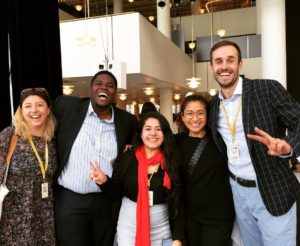Hi from Askov, Denmark,
I am admittedly still very jet lagged (and writing emails at 3 a.m.), but I’m excited to be diving into the reason that we’re here—coming up with new ideas for long-standing problems! I was selected to be a part of the Circular Economy and Waste sub-theme, which wasn’t my first choice, but after some reflection, I think that participating in this sub-theme will allow for more innovative and creative solutions.
Today, we spent the day presenting our insights and problem statements and discussing the topics and possible solutions with smaller subsets of people. My idea for re-looping post-consumer textile waste into apparel supply streams built up traction, and I was able to form a five-person team by the end of the day. The people I am meeting here constantly blow me away. One of my team members, Tomas, just started prototyping a textile that he’s making in his home country, Slovenia. He’s been able to press and seal scrap fabrics with a natural resin to make a textile that feels and looks a lot like industrial felt. It’s a beautiful and resilient material that I think holds a lot of promise.
One of the major challenges in textile recycling is our inability to separate mixed-fiber textiles—like a 93% cotton shirt that’s 7% elastane too. Our first stab at researching is to see what the latest technologies are capable of and looking into how other organic and inorganic materials are separated in other industries. Do you guys know anyone at Cornell’s Fiber Science department? Or anyone at Michigan who is into materials science?
One of the most amazing parts of this experience has been being a part of the Danish Folk High School culture. Folk High School was described to me as informal, adult “life school,” where Danes and a few foreigners enroll in courses that can last a few weeks or months. My school’s focus is on storytelling and technology, which seems to attract a wide range of ages. It’s been beautiful to see how the Danes approach learning and education, with special attention on developing whole humans who know and understand themselves.
The goal of these Folk High Schools is to develop engaged Danish and global citizens. Klaus is a former business school professor who now runs the Askov Folk High School, and he often mentions a current shift from an individualistic society to a solidarity society.
When I think about what is needed to achieve the SDGs, I think about the sheer number of people that we’ll need to get us there, and a shift in collective mentality and behavior to realize our human potential. Championing sustainability feels more spiritual now than ever before. I’m inspired to bring this education philosophy back with me to Ann Arbor and hope we can share it with fellow Erbers and beyond.
I can’t wait to reunite in a few short days. In the meantime, I’d love to hear about your experiences. HAVE FUN!!
Ciao,
p